|
|
|
Sort Order |
|
|
|
Items / Page
|
|
|
|
|
|
|
| Srl | Item |
| 1 |
ID:
190109
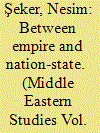

|
|
|
|
|
| Summary/Abstract |
This article addresses the nationality issue in the post-First World War Turkey through an analysis of the vibrant debates on the future of the defeated Ottoman state and its peoples. It focuses on how nationality was formulated, specifically, by the Ottoman Muslim-Turkish intellectuals, publicists and by the leadership of the National Struggle. Their interpretations of Ottomanism, Turkish nationalism, the wartime destruction of the Armenians, the situation of the Greeks and the future of the Kurds is analyzed in this respect by using the columns and editorials of contemporaneous newspapers and printed official documents. It argues that the diametrically opposed secular Ottoman nationalism cherishing co-existence of all ethnic and religious groups and the Ottomanism based on Muslimness-Turkishness were reformulated in radically changed geopolitical and demographic circumstances as the basis of the future collective identity.
|
|
|
|
|
|
|
|
|
|
|
|
|
|
|
|
| 2 |
ID:
190106
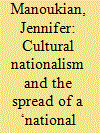

|
|
|
|
|
| Summary/Abstract |
This article explores the historical moment in which the concept of a ‘national language’ began to spread among Ottoman Armenians. It does so by examining the establishment of educational associations aimed at changing the language practices of non-Armenophone Armenians in three parts of the Ottoman Empire: Aleppo, Kayseri and Diyarbekir. I argue that these associations were part of a larger cultural nationalist movement that gained momentum in urban centers beginning in the 1840s. Through an examination of the founding principles of the associations, I show how they sought to integrate Arabic-, Turkish- and Kurdish-speaking Armenians into the would-be national community by facilitating their acquisition of Armenian. Historiographically, this article shines a spotlight on the unexamined dynamics of Ottoman Armenian cultural nationalism and language-based identity formation.
|
|
|
|
|
|
|
|
|
|
|
|
|
|
|
|
| 3 |
ID:
190115
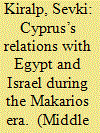

|
|
|
|
|
| Summary/Abstract |
The Makarios era (1960–1977) corresponded with two major regional disputes, with wide implications on international peace and regional politics: the Cyprus issue and the Arab–Israeli conflict. Given that these disputes are still ongoing, this study utilises diverse primary and secondary sources to analyse Cyprus’s relations with Egypt (United Arab Republic) and Israel in the Makarios period, using both political and economic perspectives. The study demonstrates that Cyprus and Egypt’s diplomatic cooperation was built on reciprocal support extended by Nasser towards the Greek Cypriots and Makarios towards Egypt in the Arab–Israeli dispute, especially in international forums such as UN debates. Although Israeli foreign policy did not threaten Cyprus directly, both Cyprus and Egypt considered Turkey a common threat. However, despite the Cypriot government’s pro-Arab stance in the Arab–Israeli conflict, Cyprus had strong relations with both Israel and Egypt concerning the economy, culture, archaeology, medicine, and telecommunications.
|
|
|
|
|
|
|
|
|
|
|
|
|
|
|
|
| 4 |
ID:
190110


|
|
|
|
|
| Summary/Abstract |
Freemasonic activity in the Ottoman lands saw an unprecedented growth and dynamism in the final phase of Ottoman history particularly benefitting from its close association with the Young Turk movement and its political apparatus, the Committee of Union and Progress (CUP). Ottoman freemasonry was led to a new level of popularity with a great deal of public visibility, a consequence of which was the formation of the Ottoman Grand Orient as a national organization for the first time in the Ottoman lands. Despite the ensuing controversial accusations and conspiracy theories against the freemasonic institution which became commonplace during the period in question, it occupied a place within the Ottoman state and society which it had never attained before. This made it possible for the Ottoman freemasons to integrate themselves to the universal fraternal discourse of the freemasonic philosophy during a last attempt of the Ottoman administration to keep its remaining lands intact. The intention of this article is to create a window within the broader picture of the socio-political environment of the time with a view to the position and involvement of freemasonry in which its association with the CUP often stands out as a major factor.
|
|
|
|
|
|
|
|
|
|
|
|
|
|
|
|
| 5 |
ID:
190111
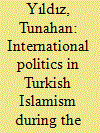

|
|
|
|
|
| Summary/Abstract |
This article will discuss the early discourse of Islamism on international politics in Cold War Turkey. It brings forth four main findings. First, while Islamists bandwagoned onto the discourse of the Turkish state and the Western bloc in presenting the Soviet Union as a national and global threat, they also sought to operationalize their anti-Sovietism for their broader political agenda. Second, Islamists effectively committed to the Western bloc during the period, but this commitment was replaced by anti-Westernism particularly from the mid-1960s onwards. Third, they substantially discussed decolonization with Pakistan, Palestine, and Algeria at the forefront, but their treatment of decolonization oscillated between glorification and devaluation and never paved the way for a Third-Worldist approach. Fourth, while pan-Islamism had an important place in their thinking, it came along with a commitment to the states-system as well as Turkey’s Cold War alliance, a retreat from classical Islamic concepts, and a conception of Turkish exceptionalism. In so doing, this article shows how the course of the Cold War shaped Islamism. It also demonstrates the pragmatism and eclecticism of Islamism. It is equally evident that Islamism was developed in interaction with, not in opposition to, nationalism and the discourse of national interest.This article will discuss the early discourse of Islamism on international politics in Cold War Turkey. It brings forth four main findings. First, while Islamists bandwagoned onto the discourse of the Turkish state and the Western bloc in presenting the Soviet Union as a national and global threat, they also sought to operationalize their anti-Sovietism for their broader political agenda. Second, Islamists effectively committed to the Western bloc during the period, but this commitment was replaced by anti-Westernism particularly from the mid-1960s onwards. Third, they substantially discussed decolonization with Pakistan, Palestine, and Algeria at the forefront, but their treatment of decolonization oscillated between glorification and devaluation and never paved the way for a Third-Worldist approach. Fourth, while pan-Islamism had an important place in their thinking, it came along with a commitment to the states-system as well as Turkey’s Cold War alliance, a retreat from classical Islamic concepts, and a conception of Turkish exceptionalism. In so doing, this article shows how the course of the Cold War shaped Islamism. It also demonstrates the pragmatism and eclecticism of Islamism. It is equally evident that Islamism was developed in interaction with, not in opposition to, nationalism and the discourse of national interest.
|
|
|
|
|
|
|
|
|
|
|
|
|
|
|
|
| 6 |
ID:
190107
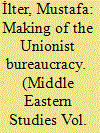

|
|
|
|
|
| Summary/Abstract |
The re-promulgation of the Constitution in 1908 upturned the late Ottoman political system, which included not just its political structure but also the bureaucratic system. Thousands of bureaucrats were dismissed from state service, regardless of their positions. Having organized the purges with limited political power, the Committee of Union of Progress (CUP) achieved a strong political project that contributed to controlling the actual state apparatus. In fact, the consensus in the literature is that purging the masses has always been an authoritarian practice prevalent in the twentieth century. This, thus, challenges the widely held notion that the CUP’s leadership preferred inspecting the government from backstage before 1913. This study aims to understand the extent of the CUP’s power in action during the early Constitutional Period. Focusing on the process of the enactment of the tensikât law, this study primarily examines the legislative methods adopted by the CUP to define the nature of power relations shared by various actors.
|
|
|
|
|
|
|
|
|
|
|
|
|
|
|
|
| 7 |
ID:
190114
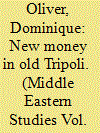

|
|
|
|
|
| Summary/Abstract |
This article seeks to describe the ways in which municipal administration and informal networks among political elites during the French mandate contributed to the poor state of public health in North Lebanon, in general, as well as an outbreak of typhoid in Tripoli by the late 1930s. This study largely stems from archival research in France and Lebanon. By examining state-building efforts within what came to be known as the annexed territories of Lebanon, this article will highlight the ways in which public health, as a function of colonial state formation, reproduced political and socio-spatial inequality. In turn, the effects of this inequality can be seen in the crumbling infrastructure and spread of infectious disease in North Lebanon. In these ways, the article will show how the mandate institutions and practices designed to centralize authority ultimately reproduced neo-patrimonialism and rather than create a new relation of power that bound residents to the metropole, further divided the population, widened inequality and set the precedent whereby control of public infrastructure became a political object to exploit while public infrastructure itself was left to erode overtime amid the contests for the spoils of office.
|
|
|
|
|
|
|
|
|
|
|
|
|
|
|
|
| 8 |
ID:
190108
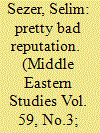

|
|
|
|
|
| Summary/Abstract |
This article elaborates how the Islamist-led revolt that erupted in Istanbul in April 1909 against the Committee of Union Progress was reflected in cities of Ottoman Syria, as well as its sources and the immediate results in terms of relations between the policymakers in Istanbul and the elites of Syria. Using primary sources such as Ottoman journals and archival documents together with several secondary sources concerning various aspects of that process, the article gives a descriptive narrative about the revolt/coup attempt itself, the events experienced in Syria and its aftermath on one hand. On the other hand, it tries to reveal the origins of the relative support given to the revolt in Syria by trying to draw a general picture of the Syrian region in late Ottoman period, taking in consideration various analyses in the existing literature in a critical way. The article claims that the revolt was supported in cities like Damascus and Nablus for both ideological and deep-rooted social reasons. It also shows how the Committee of Union of Progress, which was already prejudiced against Syrian Arabs, adopted an even more negative stance and closed one of their organizations which became in fact a scapegoat.
|
|
|
|
|
|
|
|
|
|
|
|
|
|
|
|
| 9 |
ID:
190112


|
|
|
|
|
| Summary/Abstract |
This article explores how the Egyptian revolutionary regime exploited the Mamluk past through rewriting school textbooks in order to legitimize the revolution and their leadership. Three dominant Egyptian nationalist ideologies are used to reinterpret the Mamluk past: Egyptian nationalism, Egyptian Arab nationalism and Egyptian Arab socialism. The historians were inspired by Egyptian nationalism and Egyptian Arab nationalism, reshaped history from the standpoint of Egypt and the Arabs, respectively, and selectively assimilated Mamluk history into Egyptian or Arab history. For example, the glorious Mamluk victory over the Mongols and Crusaders is represented as Egypt’s or the Arabs’ victory. Similarly, not only Mamluk leaders (mostly Baybars), but also other distinguished Mamluk leaders (Iraqi Mamluk leaders) are revived as Egyptian or Arab heroes. On the other hand, the historians of Arab socialism pursued a different pattern, to a certain extent. According to this narrative, the ones who actually brought victory over the Mongols and Crusaders were not the Mamluk leaders, but ‘the people’. In an intensive manner, Mamluk memory was politically exploited by the Free Officers’ government for reviving the splendor of the Egyptian past and reproducing it again in the real world.
|
|
|
|
|
|
|
|
|
|
|
|
|
|
|
|
| 10 |
ID:
190113


|
|
|
|
|
| Summary/Abstract |
This article studies the Muslim Brotherhood’s (MB) second prison ordeal in Egypt between 1954–1964. Based on a collection of prison memoirs written by Brothers, the article explores in three parts how the MB developed socially, intellectually, and organisationally in prison during the reign of President Gamal Abdel Nasser. Beginning with the MB’s imprisonment in the aftermath of the President’s attempted assassination in 1954, the first part describes how the Brothers built a vibrant prison community for themselves within al-Wahat Camp. Against the backdrop of the Suez War in 1956, the second part demonstrates the debates that erupted among the Brothers on whether to support Nasser in the event of a war with Israel and the West. Following the Brothers’ ideological and physical separation between so-called Supporters and Opponents, the third part explores how an increasing antipathy towards Nasser developed among some of the Brothers in al-Mahariq Prison until their unexpected release in 1964. Thus, by acknowledging the prison institution as a crucial site for ideology-formation, this article ultimately seeks to explore not what state repression restricted the Brothers from doing, but what they managed to do in spite of it.
|
|
|
|
|
|
|
|
|
|
|
|
|
|
|
|
|
|
|
|
|